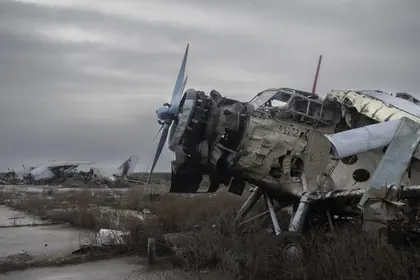– UN nuclear chief chief denounces strikes on Ukraine power plant –
The UN’s atomic watchdog chief on Sunday, Nov. 20, denounced “targeted” strikes at Ukraine’s Russian-controlled Zaporizhzhia nuclear plant, calling for a “stop to this madness”, as Kyiv and Moscow traded blame.
JOIN US ON TELEGRAM
Follow our coverage of the war on the @Kyivpost_official.
Ukraine meanwhile dismissed Russian accusations that it had executed surrendering soldiers.
- Get the newest Ukraine news reports as of today.
- Check the most up-to-date Ukraine news reports from today.
“The news from our team yesterday and this morning is extremely disturbing,” said a statement Sunday from Rafael Grossi, head of the International Atomic Energy Agency.
“Explosions occurred at the site of this major nuclear power plant, which is completely unacceptable.
“Whoever is behind this, it must stop immediately,” he added.
“As I have said many times before, you’re playing with fire!”
There were more than a dozen blasts overnight Saturday to Sunday, some of which a team of experts from the agency on site had themselves seen, the IAEA said in a statement.
Speaking to French broadcaster BFMTV later Sunday, Grossi was clear that the strikes on the plant were no accident.
“The people who are doing this know where they are hitting. It is absolutely deliberate, targeted.”
The IAEA is to send a team of experts to the plant — the biggest nuclear facility in Europe — and which is currently controlled by Russian troops.

What if Russia Wins?
– ‘Staged surrender’ –
Ukraine meanwhile dismissed Russian accusations that its soldiers had killed Russian troops as they were surrendering, in what Moscow has described as a “war crime”.
Extracts from the video footage in question showed that in fact, Russian forces had used a “staged surrender” to open fire on Ukrainian soldiers, Dmytro Lubinets, the parliament’s commissioner for human rights said Sunday.
“In this case, persons among the Russian servicemen cannot be considered prisoners of war, but are those who are fighting and committing treachery,” he added.
“Returning fire is not a war crime. On the contrary, those who want to use the protection of international law to kill must be punished.”
Video footage circulated on Russian social media last week purported to show the bodies of Russian servicemen killed after surrendering to Ukrainian troops.
AFP has not independently confirmed the videos.
A UN spokesperson told AFP on Friday it was “aware of the videos” and “looking into them”.
– Russian shelling –
In the southern city of Kherson, which Ukrainian troops recently recaptured, residents were facing a fresh challenge after eight months of occupation by Moscow’s troops — Russian artillery attacks.
After Russian shells pounded the industrial area next to their home, setting fire to an oil depot there, Yuri Mosolov and his wife decided it was time to leave.
“After yesterday’s shelling, my wife said: let’s not take too many risks and go,” Mosolov told AFP.
A carefully planned campaign by Kyiv targeting logistics networks, bridges and pontoon crossings battered Russian supply lines and forced their troops to abandon the city and retreat to the Dnipro’s eastern bank.
Now the armies are increasingly engaging in heavy artillery exchanges across the river.
“Artillery duels are still going on. The combat continues,” said Dmytro Pletenchuk, the Ukrainian military’s spokesman in the area. “Kherson is now on the frontline.”
Elsewhere near Kherson, Russian strikes hit near a humanitarian distribution area in the village of Bilozerka, sending residents fleeing on Saturday.
– Terms for peace –
Ukraine’s President Volodymyr Zelensky, in his daily address, said there had been nearly 400 Russian attacks in the east of the country alone on Sunday.
The toughest battles, he said, were in the eastern Donetsk region — one of those Russia now claims as its own. Fighting was also continuing in neighboring Lugansk.
Teams were working around the clock to repair damage to the energy infrastructure wrought by Russia’s artillery bombardments — but “stabilization blackouts” were nevertheless necessary in 15 regions, including Kyiv, he added.
And he once again set out Kyiv’s terms for peace, which include food and energy security, the release of all prisoners and deportees and the withdrawal of Russian troops from all Ukrainian territory.
You can also highlight the text and press Ctrl + Enter






